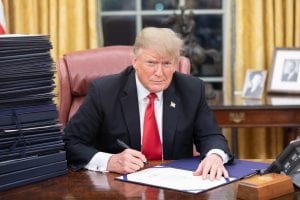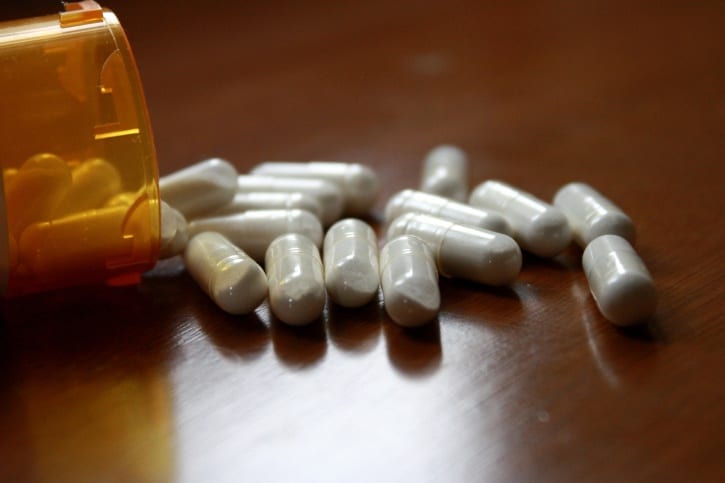Whether hydroxychloroquine can help cure coronavirus remains uncertain–but one Chinese study indicates it probably doesn’t do much good.
President Donald Trump’s endorsement of hydroxychloroquine as a treatment for novel coronavirus has created complications across the country.
“HYDROXYCHLORQUINE & AZITHROMYCIN, taken together, have a real chance to be one of the biggest game changers in the history of medicine,” Trump tweeted on Saturday.
Trump’s message, says Vox, prompted some people to seek out chemical out in hopes of self-medicating. In some cases, such self-medication has had disastrous results: shortly after Trump’s tweet hit the internet, Nigeria saw several deaths from hydroxychloroquine overdose or misuse. And, more recently, an Arizona man passed away after drinking a toxic fish tank cleaner that contained the same active ingredient as anti-malarial medicines.
According to Vox, the man’s wife said he’d ingested the chemical after recognizing its name; he’d heard Trump mention the drug on television.
But Trump’s take on hydroxychloroquine, a common anti-malarial medicine, isn’t supported by science. Bloomberg.com notes that a recently-published small-scale study, conducted in China, found that hydroxychloroquine is no more effective in treating COVID-19 than any other form of conventional care.
The study—which Bloomberg says was published by the Journal of Zhejiang University—suggested that coronavirus patients given anti-malarial medications didn’t experience better outcomes than those who were given another prescription, or none at all.
However, the study was relatively small in scope: it involved only 30 patients. Fifteen were given hydroxychloroquine, and of those fifteen, most tested negative for coronavirus after a week of treatment. The other fifteen patients didn’t receive hydroxychloroquine, yet, similarly, fourteen of the lot tested negative after a week.
Trump’s conclusion, then, appear contingent off the results of yet another small-scale study. That one, conducted in France, involved 40 patients. It found that hydroxychloroquine treatment appeared to enhance patients’ ability to fight novel coronavirus, but the experiment’s design was extensively criticized.
Despite contrasting studies and all-around uncertainty, the Trump administration is continuing to puts its faith in hydroxychloroquine. On Saturday, Vice President Mike Pence told attendees at a White House event that the medicine seemed promising.
“Doctors can now prescribe chloroquine for that off-label purpose of dealing with the symptoms of coronavirus,” Pence said. “The president’s very optimistic.”

Indeed he is: Trump, by his own account, is directing the federal government to order the medication en masse.
“At my direction, the federal government is working to help obtain large quantities of chloroquine,” Trump said on Fox News Monday evening. “We think tomorrow, pretty early, the hydroxychloroquine and Z-Pak I think is [sic] a combination is looking very, very good and it’s going to be distributed.”
Perhaps not so coincidentally, pharmacies in different parts of the country are now struggling to fill hydroxychloroquine prescriptions—not all of which seem genuine.
The Columbus Dispatch recounts how Hilliard, Ohio, resident Jennifer Tacker tried to refill her hydroxychloroquine prescription on Monday; Tacker, an arthritis patient, has been using the medication to relieve some of her symptoms.
But when Tacker showed up to her regular Meijer pharmacy, she was informed its hydroxychloroquine was completely depleted. Days before, says the Dispatch, a veterinarian had ordered a massive prescription for a dog. And an Akron-area emergency room doctor had taken 1,000 pills for himself.
In response to the unexpected uptick in hydroxychloroquine request, Ohio Attorney General Dave Yost issued a joint statement alongside federal prosecutors. In it, Yost vowed to indict any doctors who abuse their positions to obtain unnecessary prescriptions, saying “we will move swiftly to identify and prosecute any wrongdoing that is a violation of federal or state law.”
Doctors, notes the Dispatch, aren’t prohibited from writing themselves prescriptions; however, the practice is generally frowned upon.
In Ohio, though, requests for hydroxychloroquine have come in from around the country: pharmacist Sydney Schnee told the Dispatch she’s received orders from Rhode Island, Connecticut, and California. In many cases, the prescriptions were for physicians’ family members, often accompanied by unusual dosage requests: 10 pills, 120, 500, sometimes up to 1,000.
“It was clear the doctors weren’t familiar with the dosing, the proper dose levels,” Schnee said. “We filled them up at first but reported it up the chain, and it was quickly addressed.”
Yet Vox concedes Trump’s enthusiasm for hydroxychloroquine and azithromycin isn’t wholly unfounded: both medicines, used in tandem, have anti-viral properties. And limited lab cell culture studies have shown the cocktails’ efficacy in combating the strain of SARS responsible for novel coronavirus.
However, hydroxychloroquine is notorious for its side effects—in recent years, physicians prescribing anti-malarials have tended to warn patients away from it, recommending safer alternatives like atovaquone and proguanil. Hydroxychloroquine can, for instance, induce delirium and psychotic fits, as well as cardiac distress.
In the meantime, Trump’s pro-hydroxychloroquine rhetoric is making the medication dangerously difficult to find for patients who need it—whether for malaria prevention, arthritis, or the host of auto-immune disorders it can help regulate.
Sources
Coronavirus: Hydroxychloroquine for a dog? Questionable prescriptions poured into Ohio pharmacies
Malaria Drug Chloroquine No Better Than Regular Coronavirus Care, Study Finds
Trump’s reckless promotion of hydroxychloroquine to fight coronavirus, explained


Join the conversation!